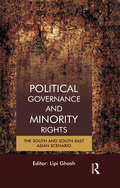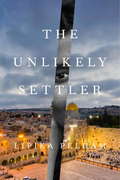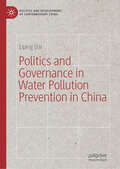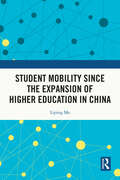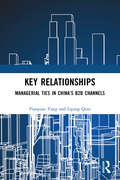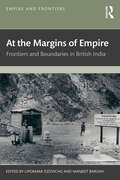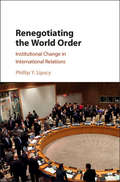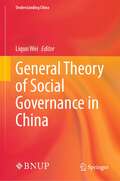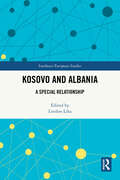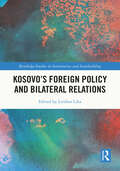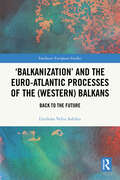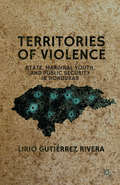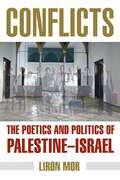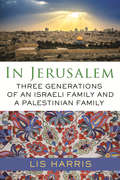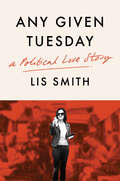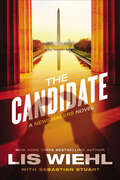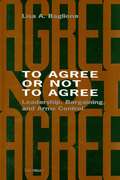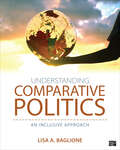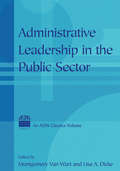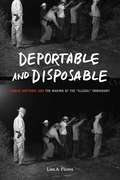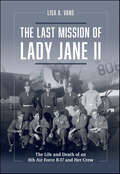- Table View
- List View
Political Governance and Minority Rights: The South and South-East Asian Scenario
by Lipi GhoshThis volume brings together a collection of essays analysing the current scenario in South and Southeast Asia with respect to the position of minority groups. Based on an in-depth investigation of some of the lasting minority–majority conflicts of the post-colonial period in countries that often escape comparison, the articles are a rich and critical exposition of the social, economic, cultural and political dimensions of these struggles. The central question being addressed is that of community rights in the modern nation-state and how these are being understood by the two concerned parties and, where and when, thereof, a situation of conflict arose.
The Unlikely Settler
by Lipika PelhamThe Israeli-Palestinian conflict seen by an outsider who craves to make sense of herself, her marriage, and the city she lives inThe Unlikely Settler is none other than a young Bengali journalist who moves to Jerusalem with her English-Jewish husband and two children. He speaks Arabic and is an arch believer in the peace process; she leaves her career behind to follow his dream. Jerusalem propels Pelham into a world where freedom from tribal allegiance is a challenging prospect. From the school you choose for your children to the wine you buy, you take sides at every turn.Pelham's complicated relationship with her husband, Leo, is as emotive as the city she lives in, as full of energy, pain, and contradictions. As she tries to navigate the complexities and absurdities of daily life in Jerusalem, often with hilarious results, Pelham achieves deep insights into the respective woes and guilt of her Palestinian and Israeli friends. Her intelligent analysis suggests a very different approach to a potential resolution of the conflict.
Politics and Governance in Water Pollution Prevention in China (Politics And Development Of Contemporary China Series)
by Liping DaiThis book applies an interdisciplinary governance assessment framework to assess China’s water quality governance from a holistic point of view. The project explores China’s water quality status, water policy discourses, water regulations, public participation in water governance, the path towards green water law, eco-compensation approach in water quality management and the implementation mechanism for achieving water goals. It will appeal to academics in water law, researchers and practitioners dealing with water management, as well as a general audience interested in water issues.
Student Mobility Since the Expansion of Higher Education in China
by Liping MaThis book examines the characteristics of Chinese college students' mobility since the expansion of higher education by using a nationally representative data set. It analyzes college graduates' mobility from both horizontal and vertical dimensions. The horizontal dimension shows college students' migration directions and location changes, including migration for college, migration for employment, migration for grassroots positions, migration away from the capital, and migration back to their hometown. The vertical dimension includes students' intergenerational occupational mobility and intergenerational regional mobility. Drawing on theories of education and economics, the book provides a solid framework for empirically analyzing the characteristics, causes, and economic and non-economic benefits of different forms of mobility. This book not only offers insights into China's higher education policies and their impact on the regional and intergenerational mobility decisions of college graduates over the past two decades, but also has important implications for countries at similar stages of social and economic development. This book is an excellent read for students and scholars of education, economics, and East Asian studies. It can also help policymakers understand the characteristics of students' mobility and the underlying reasons for their choices, so that they can propose effective policies in the future.
Key Relationships: Managerial Ties in China’s B2B Channels
by Pianpian Yang Liping QianThis book explores the governance and ramifications of managerial ties in China’s B2B contexts, with the aim of uncovering theoretical mechanisms and practical strategies for effective management of these relationships.In this book, managerial ties refer to personal relationships between corporate executives, business partners, and government or regulatory officials. While common in the Chinese business environment, these relationships are gaining recognition and value globally. Drawing on insights from four empirical studies, the authors focus on managerial ties within channel relationships among Chinese firms. The book analyzes how business and political ties affect channel outcomes, highlights the limitations of managerial ties in emerging markets, and identifies conditions or mechanisms that may lead to negative effects.This work will be valuable to researchers and students of business management and relationship marketing, as well as to business professionals interested in Chinese business practices and multinational companies operating in China.
At the Margins of Empire: Frontiers and Boundaries in British India (Empire and Frontiers)
by Lipokmar Dzüvichü and Manjeet BaruahEmpire building in British India was inseparably tied to the processes of frontier-making and the creation of boundaries. Through a range of complex practices and developments, the constitution of these spaces took shape at various historical conjunctures. The making of these spaces was also shaped by a variety of imperial concerns, including local and global processes, connections, and entanglements. Focusing on the period between the 19th and the early 20th centuries, this book looks at how the dynamics of frontier and boundary creation were shaped by a variety of agents, institutions, infrastructure and technologies, events, economy, travel, forms of representation, and imperial rivalries. The role of capital, war, and violence was also intrinsic to the creation of such spaces. Further, societies in these spaces responded to these processes in various ways. The book examines how they negotiated and mediated these complex developments of modern space-making in multiple ways at the margins of empire.Part of the Empire and Frontiers series, this book will be of interest to researchers and readers of history, anthropology, cultural studies, social and cultural history, frontiers, boundaries and borderland studies, Himalayan studies, and studies of commodities and circulations.
Renegotiating the World Order: Institutional Change in International Relations
by Lipscy Phillip Y.Rising powers often seek to reshape the world order, triggering confrontations with those who seek to defend the status quo. In recent years, as international institutions have grown in prevalence and influence, they have increasingly become central arenas for international contestation. Phillip Y. Lipscy examines how international institutions evolve as countries seek to renegotiate the international order. He offers a new theory of institutional change and explains why some institutions change flexibly while others successfully resist or fall to the wayside. The book uses a wealth of empirical evidence - quantitative and qualitative - to evaluate the theory from international organizations such as the International Monetary Fund, World Bank, European Union, League of Nations, United Nations, the International Telecommunications Satellite Organization, and Internet Corporation for Assigned Names and Numbers. The book will be of particular interest to scholars interested in the historical and contemporary diplomacy of the United States, Japan, and China.
General Theory of Social Governance in China (Understanding China)
by Liqun WeiThis book discusses the connotation and function of social governance and elaborates on social governance thought in classical Marxism, Mao Zedong’s social governance thought, and social governance thought in socialism with Chinese characteristics, especially in Xi Jinping’s New Era. Together, these components constitute the basic theory of social governance in China. Moreover, the book clarifies ancient and modern social governance thought in China and analyzes institutional innovations, practices, and experiences of Chinese social governance. It depicts the evolution and reform of social governance in China both vertically and horizontally. In turn, it addresses the overall system, fundamental institutions, hierarchy, field, and mode of China’s social governance, as well as its connection to national security. It discusses major issues and their causes, together with enhancing mechanisms. In closing, it outlines future trends in Chinese social governance, and its role in and effects on the global governance system.
Kosovo and Albania: A Special Relationship (Southeast European Studies)
by Liridon LikaThis book offers an original analysis of relations between the Republic of Kosovo and the Republic of Albania, with a particular focus on the 2008–2025 period. It provides an inside perspective bringing together scholarly contributions from academics, researchers, and diplomats from both countries. As Kosovo and Albania are inhabited by an overwhelming majority of ethnic Albanians, relations are fraternal, deep, and extensive, with the two states signing numerous agreements and memoranda in the political, economic, educational, cultural and security fields. This special relationship is explored through innovative and multidisciplinary approaches, thus making the study both timely and relevant.The book will be of key interest to scholars, diplomats, and students focusing on Political Science, International Relations, History, Kosovo’s foreign policy, Albania’s foreign policy, and Southeast Europe.
Kosovo’s Foreign Policy and Bilateral Relations (Routledge Studies in Intervention and Statebuilding)
by Liridon LikaThis edited book analyzes Kosovo’s foreign policy and bilateral relations with the United States and several European countries. After the 1999 liberation from Serbia, Kosovo built close relations with various countries that supported it in the process of reconstruction, economic stabilization, institution-building, and state-building. From 1999 to 2008, many of these states were politically and operationally engaged in Kosovo under the leadership of the North Atlantic Treaty Organization (NATO) and of the United Nations Interim Administration Mission in Kosovo (UNMIK). Since its independence in 2008, the Republic of Kosovo has adopted a foreign policy in accordance with its values and strategic interests, a foreign policy that aims to strengthen Kosovo’s security and foster its socio-economic prosperity in collaboration with primarily Western countries. In this volume, each chapter is dedicated to Kosovo’s bilateral relations with a selected state with which it has established diplomatic relations. The book shows that Kosovo has been able to develop and achieve strong bilateral relations with major allies and partners. It argues that Kosovo’s foreign policy aims to develop, maintain, and enhance the position of the young state on the international stage. The volume bridges various methodological and disciplinary approaches in order to present Kosovo’s foreign policy objectives and the trajectory of its relations with some of its most important international partners. This book will be of interest to students of Balkan politics, state-building, foreign policy, and International Relations.
‘Balkanization’ and the Euro-Atlantic Processes of the: Back to the Future (ISSN)
by Liridona Veliu AshikuThis book explores how ‘balkanization’ as a discourse underpins the policies of the European Union (EU) and the North Atlantic Treaty Organization (NATO) toward the Western Balkans. It shows how EU and NATO policies have emerged from, and led to, the constant reinvention of the unity of the West through ‘balkanizing’ the region and illustrates how this dynamic is maintained by and instrumentalized for the political elites. Through a genealogical analysis that stretches from the Balkans Wars to more recent events such as North Macedonia’s change of name in 2018, the author shows how Western policies have aimed at recreating the united West on the back of the ‘broken’ Balkans. The book will appeal to scholars and students of Southeast Europe, International Relations, Political Science, Peace and Conflict Studies and History.
Territories of Violence
by Lirio Gutiérrez RiveraThis book examines the persistence of social violence and public insecurity in Honduras. Using a spatial perspective, the author looks at the Honduran state's security polices - known as Mano Dura - and the challenges authorities face. She points to the state's historical difficulty producing and ordering political territory and space.
Conflicts: The Poetics and Politics of Palestine-Israel
by Liron MorLiron Mor’s book queries what conflict means in the context of Palestine–Israel. Conflict has long been seen as singular and primary: as an “original sin” that necessitates the state and underwrites politics. This book problematizes this universal notion of conflict, revealing its colonial implications and proposing that conflicts are always politically constructed after the fact and are thus to be understood in their various specific forms. The book explores sites of poetic and political strife in Palestine–Israel by combining a comparative study of Hebrew and Arabic literature with political and literary theory. Mor leverages an archive that ranges from the 1930s to the present, from prose and poetry to film and television, to challenge the conception of the Palestinian–Israeli context as a conflict, delineating the colonial history of this concept and showing its inadequacy to Palestine–Israel. Instead, Mor articulates locally specific modes of theorizing the antagonisms and mediations, colonial technologies, and anticolonial practices that make up the fabric of this site. The book thus offers five figurative conflictual concepts that are derived from the poetics of the works: conflict (judgment/ishtibāk), levaṭim (disorienting dilemmas), ikhtifāʾ (anti/colonial disappearance), ḥoḳ (mediating law), and inqisām (hostile severance). In so doing, Conflicts aims to generate a historically and geographically situated mode of theory-making, which defies the separation between the conceptual and the poetic.
In Jerusalem: Three Generations of an Israeli Family and a Palestinian Family
by Lis HarrisA fresh lens on the Israeli-Palestinian conflict that examines the life-shaping reverberations of wars and ongoing tensions upon the everyday lives of families in Jerusalem.An American, secular, diasporic Jew, Lis Harris grew up with the knowledge of the historical wrongs done to Jews. In adulthood, she developed a growing awareness of the wrongs they in turn had done to the Palestinian people. This gave her an intense desire to understand how the Israelis' history led them to where they are now. However, she found that top-down political accounts and insider assessments made the people most affected seem like chess pieces. What she wanted was to register the effects of the country's seemingly never-ending conflict on the lives of successive generations. Shuttling back and forth over ten years between East and West Jerusalem, Harris learned about the lives of two families: the Israeli Pinczowers/Ezrahis and the Palestinian Abuleils. She came to know members of each family--young and old, religious and secular, male and female. As they shared their histories with her, she looked at how each family survived the losses and dislocations that defined their lives; how, in a region where war and its threat were part of the very air they breathed, they gave children hope for their future; and how the adults' understanding of the conflict evolved over time. Combining a decade of historical research with political analysis, Harris creates a moving portrait of one of the most complicated and controversial conflicts of our time.
Any Given Tuesday: A Political Love Story
by Lis SmithAn irreverent look behind the scenes of American politics from one of the most sought-after operatives in the Democratic PartyLis Smith isn’t your average political strategist and Any Given Tuesday isn’t your typical political memoir. At once a revealing look at human nature at the highest levels of power and an intimate portrayal of a sometimes rocky personal journey, it breaks all the rules. Smith doesn’t pretend to be perfect—she owns the controversial choices that landed her in the tabloids, as well as the unorthodox ones that have paid off and defined her successful career. Any Given Tuesday follows Smith from her earliest experiences as a college-aged intern to her days as a trusted adviser and confidante to some of the most high-profile politicians in the country—including her star turn as senior adviser on Pete Buttigieg’s 2020 presidential campaign. Animated by Smith’s love for the hand-to-hand combat of politics and sustained by her deeply-held belief that it’s still possible to effect positive change, it’s an odyssey full of highs and lows and larger-than-life characters. Throughout, Smith shows what it’s really like behind the curtain: what happens when the lights go down and the cameras turn off, how it feels to be in the eye of the political media storm, and how the people responsible for heady, life and death decisions are as flawed as the rest of us.While the journey hasn’t always been smooth, Lis Smith has seen and learned a lot—and she shares it all in this eye-opening, entertaining memoir.
The Candidate: The Newsmakers, The Candidate, The Separatists (The Newsmakers Novels #2)
by Lis Wiehl Sebastian StuartHow far will a candidate go to become president? Erica Sparks—America&’s top-rated cable-news host— is about to find out.Mike Ortiz is a dynamic war hero favored to win the White House. Standing by his side is his glamorous and adoring wife, Celeste. But something about this seemingly perfect couple troubles Erica. Is Celeste really who she seems? And most importantly, what really happened in that squalid Al-Qaeda prison where Mike Ortiz spent nine months?But more than the nation&’s future is at stake. Erica&’s relentless search for the truth puts the life of her preteen daughter Jenny in danger, even as Erica&’s own dark past threatens to overtake her.In her latest Newsmakers thriller, New York Times bestselling author and Fox News legal analyst Lis Wiehl weaves a taut and chilling story. The Candidate is packed with political intrigue and media manipulation as the lust for power turns deadly indeed.
The Newsmakers Collection: The Newsmakers, The Candidate, The Separatists (A Newsmakers Novel)
by Lis Wiehl Sebastian StuartThe NewsmakersTV reporter Erica Sparks has become a superstar overnight. Is it due to her hard work and talent, or is she at the center of a spiraling conspiracy?On her very first assignment, Erica inadvertently witnesses—and films—a horrific tragedy, scooping all the other networks. Mere weeks later, another tragedy strikes—again, right in front of Erica and her cameras.Erica will stop at nothing to uncover the truth. But she has to make sure disaster—and her troubled past—don’t catch up with her first.The CandidateHow far will a candidate go to become president? Erica Sparks—America’s top-rated cable-news host—is about to find out.Mike Ortiz is a dynamic war hero favored to win the White House. Standing by his side is his glamorous and adoring wife, Celeste. But something about this seemingly perfect couple troubles Erica.The Candidate is packed with political intrigue and media manipulation as the lust for power turns deadly indeed.The SeparatistsAfter getting the green light from her network to launch an investigative news show, Erica flies to Bismarck, North Dakota, to investigate Take Back Our Homeland, the largest secessionist group. What she finds is profoundly disturbing—a growing threat to the future of our union.Then she discovers a potential informant murdered in her Bismarck hotel. Take Back Our Homeland might be even more dangerous than she had thought—and she’s unwittingly become one of the key players in the story. Her fear and anxiety escalate—for her marriage, her daughter, and her own life.
To Agree or Not to Agree: Leadership, Bargaining, and Arms Control
by Lisa A. BaglioneWhy were the leaders of the United States and the Soviet Union able to negotiate a series of arms control agreements despite the deep and important differences in their interests during the Cold War? Lisa A. Baglione considers a variety of explanations for the successes--and failures--of these negotiations drawn from international relations theories. Focusing on the goals and strategies of individual leaders--and their ability to make these the goals and strategies of their nation--the author develops a nuanced understanding that better explains the outcome of these negotiations. Baglione then tests her explanation in a consideration of negotiations surrounding the banning of above-ground nuclear tests, the Strategic Arms Limitation Talks of the 1970s, the negotiations for the limitation of intermediate-range nuclear forces in the 1980s, and the last negotiations between the Americans and the disintegrating Soviet Union in 1990 and 1991. How these great rivals were able to negotiate significant arms control agreements not only will shed light on international relations during an important period of history but will help us understand how such agreements might develop in the post-Cold War period, when arms proliferation has become a serious problem. This book will appeal to scholars of international relations and arms control as well as those interested in bargaining and international negotiations and contemporary military history. Lisa A. Baglione is Assistant Professor of Political Science, St. Joseph's University.
Understanding Comparative Politics: An Inclusive Approach
by Lisa A. Baglione"Baglione speaks cogently to our current generation of college students, who came of age amidst resurgent racism and an unprecedented pandemic." —Audie Klotz, Syracuse University It’s time for a new approach to help students engage more fully with comparative politics. By elevating all the components of identity as core elements of any political system, Lisa A. Baglione′s Understanding Comparative Politics helps students better appreciate the lived realities of people around the world. The book puts issues of race, gender, ethnicity, and religion in context, encouraging students to think critically about world regions and individual countries through the lens of current issues like social justice movements and the COVID-19 pandemic. Throughout the book, Baglione empowers students to be active learners in this sometimes-daunting subject by engaging them in important questions, grounding them in foundational concepts like geography, and helping them make personal connections. This title is accompanied by a complete teaching and learning package. Learning Platform / Courseware Sage Vantage is an intuitive learning platform that integrates quality Sage textbook content with assignable multimedia activities and auto-graded assessments to drive student engagement and ensure accountability. Unparalleled in its ease of use and built for dynamic teaching and learning, Vantage offers customizable LMS integration and best-in-class support. It′s a learning platform you, and your students, will actually love. . Assignable Video with Assessment Assignable video (available in Sage Vantage) is tied to learning objectives and curated exclusively for this text to bring concepts to life. LMS Cartridge: Import this title’s instructor resources into your school’s learning management system (LMS) and save time. Don’t use an LMS? You can still access all of the same online resources for this title via the password-protected Instructor Resource Site.
Understanding Comparative Politics: An Inclusive Approach
by Lisa A. Baglione"Baglione speaks cogently to our current generation of college students, who came of age amidst resurgent racism and an unprecedented pandemic." —Audie Klotz, Syracuse University It’s time for a new approach to help students engage more fully with comparative politics. By elevating all the components of identity as core elements of any political system, Lisa A. Baglione′s Understanding Comparative Politics helps students better appreciate the lived realities of people around the world. The book puts issues of race, gender, ethnicity, and religion in context, encouraging students to think critically about world regions and individual countries through the lens of current issues like social justice movements and the COVID-19 pandemic. Throughout the book, Baglione empowers students to be active learners in this sometimes-daunting subject by engaging them in important questions, grounding them in foundational concepts like geography, and helping them make personal connections. This title is accompanied by a complete teaching and learning package. Learning Platform / Courseware Sage Vantage is an intuitive learning platform that integrates quality Sage textbook content with assignable multimedia activities and auto-graded assessments to drive student engagement and ensure accountability. Unparalleled in its ease of use and built for dynamic teaching and learning, Vantage offers customizable LMS integration and best-in-class support. It′s a learning platform you, and your students, will actually love. . Assignable Video with Assessment Assignable video (available in Sage Vantage) is tied to learning objectives and curated exclusively for this text to bring concepts to life. LMS Cartridge: Import this title’s instructor resources into your school’s learning management system (LMS) and save time. Don’t use an LMS? You can still access all of the same online resources for this title via the password-protected Instructor Resource Site.
Administrative Leadership in the Public Sector
by Montgomery Van Wart Lisa A. DickeAdministrative Leadership in the Public Sector is an ideal resource for any Public Administration course involving leadership and public management. Each of the book’s nine main sections begins with introductory text by the volume’s editors, Monty Van Wart and Lisa Dicke, followed by relevant readings. The volume includes some of the most important readings on public leadership published in the last eight decades. More than just an anthology, Administrative Leadership in the Public Sector provides a unique and useful framework for understanding the vast subject of leadership.
Deportable and Disposable: Public Rhetoric and the Making of the “Illegal” Immigrant (Rhetoric and Democratic Deliberation #24)
by Lisa A. FloresIn the 1920s, the US government passed legislation against undocumented entry into the country, and as a result the figure of the "illegal alien" took form in the national discourse. In this book, Lisa A. Flores explores the history of our language about Mexican immigrants and exposes how our words made these migrants "illegal."Deportable and Disposable brings a rhetorical lens to a question that has predominantly concerned historians: how do differently situated immigrant populations come to belong within the national space of whiteness, and thus of American-ness? Flores presents a genealogy of our immigration discourse through four stereotypes: the "illegal alien," a foreigner and criminal who quickly became associated with Mexican migrants; the "bracero," a docile Mexican contract laborer; the "zoot suiter," a delinquent Mexican American youth engaged in gang culture; and the "wetback," an unwanted migrant who entered the country by swimming across the Rio Grande. By showing how these figures were constructed, Flores provides insight into the ways in which we racialize language and how we can transform our political rhetoric to ensure immigrant populations come to belong as part of the country, as Americans.Timely, thoughtful, and eye-opening, Deportable and Disposable initiates a necessary conversation about the relationship between racial rhetoric and the literal and figurative borders of the nation. This powerful book will inform policy makers, scholars, activists, and anyone else interested in race, rhetoric, and immigration in the United States.
Deportable and Disposable: Public Rhetoric and the Making of the “Illegal” Immigrant (Rhetoric and Democratic Deliberation)
by Lisa A. FloresIn the 1920s, the US government passed legislation against undocumented entry into the country, and as a result the figure of the “illegal alien” took form in the national discourse. In this book, Lisa A. Flores explores the history of our language about Mexican immigrants and exposes how our words made these migrants “illegal.”Deportable and Disposable brings a rhetorical lens to a question that has predominantly concerned historians: how do differently situated immigrant populations come to belong within the national space of whiteness, and thus of American-ness? Flores presents a genealogy of our immigration discourse through four stereotypes: the “illegal alien,” a foreigner and criminal who quickly became associated with Mexican migrants; the “bracero,” a docile Mexican contract laborer; the “zoot suiter,” a delinquent Mexican American youth engaged in gang culture; and the “wetback,” an unwanted migrant who entered the country by swimming across the Rio Grande. By showing how these figures were constructed, Flores provides insight into the ways in which we racialize language and how we can transform our political rhetoric to ensure immigrant populations come to belong as part of the country, as Americans.Timely, thoughtful, and eye-opening, Deportable and Disposable initiates a necessary conversation about the relationship between racial rhetoric and the literal and figurative borders of the nation. This powerful book will inform policy makers, scholars, activists, and anyone else interested in race, rhetoric, and immigration in the United States.
International Communism and the Spanish Civil War
by Lisa A. KirschenbaumInternational Communism and the Spanish Civil War provides an intimate picture of international communism in the Stalin era. Exploring the transnational exchanges that occurred in Soviet-structured spaces - from clandestine schools for training international revolutionaries in Moscow to the International Brigades in Spain - the book uncovers complex webs of interaction, at once personal and political, that linked international communists to one another and the Soviet Union. The Spanish Civil War, which coincided with the great purges in the Soviet Union, stands at the center of this grassroots history. For many international communists, the war came to define both their life histories and political commitments. In telling their individual stories, the book calls attention to a central paradox of Stalinism - the simultaneous celebration and suspicion of transnational interactions - and illuminates the appeal of a cause that promised solidarity even as it practiced terror.
The Last Mission of Lady Jane II: The Life and Death of an 8th Air Force B-17 and Her Crew
by Lisa A. VansFurther insight into the experience for 8th Air Force bomber crews over Germany, and in German captivity. New revelations about the investigation of the murder of several American bomber crewmen by German civilians. Learn personal stories about the crewmen of Lady Jane II, including the postwar struggles of the survivors.
